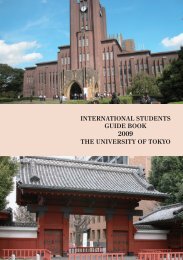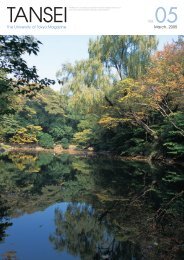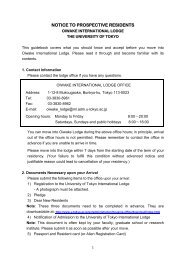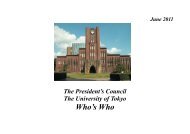brochure
brochure
brochure
Create successful ePaper yourself
Turn your PDF publications into a flip-book with our unique Google optimized e-Paper software.
Graduate School of<br />
Agricultural and Life Sciences<br />
1-1-1, Yayoi, Bunkyo-ku, Tokyo, 113-8657 JAPAN<br />
IPADS Office: +81-3-5841-0770,<br />
info@ipads.a.u-tokyo.ac.jp<br />
International Program<br />
in Agricultural Development Studies (IPADS) Master’s/Doctorate<br />
http://ipads.a.u-tokyo.ac.jp/<br />
About the program<br />
Inaugurated in the academic year 2010/2011, the International<br />
Program in Agricultural Development Studies (IPADS) is the<br />
School’s premier English-language program at Master’s level.<br />
In 2012/13, the doctor’s program also launches. Issue-oriented<br />
rather than methodology-oriented, these exciting international<br />
programs offer their candidates the opportunity to develop the<br />
requisite expertise across discipline and country boundaries<br />
to tackle agricultural and environmental problems in developing<br />
countries around the world.<br />
Program structure<br />
IPADS – MSc is a two-year coursework and research program<br />
towards the University of Tokyo’s MSc (Agricultural Sciences)<br />
degree. To graduate, students must satisfactorily gain 30 credit<br />
points from a truly multidisciplinary set of subjects: plant science,<br />
animal science, forestry, fisheries and social sciences. Typically,<br />
students complete the coursework component of the Program<br />
in their first year whilst designing and preparing for their original<br />
research and then engage in full-time research in their second<br />
year. Throughout the program, students are actively involved in the<br />
School’s research community, participating in weekly seminars,<br />
thematic workshops and academic conferences. Credit points for<br />
the research component of the Program are awarded for these<br />
activities, which are designed to build the foundation to write<br />
a high-quality master’s thesis. With the program coordinator’s<br />
prior approval, students can enroll in other courses offered at the<br />
University in lieu of one or more of the subjects of the program.<br />
IPADS–PhD is the full research program typically for three years.<br />
Research component<br />
Students complete the research component of these Programs<br />
under the supervision of one or more of the School’s faculty. Students<br />
have opportunities to work with suitable members of staff to<br />
satisfy their own requirements and research interest. Research disciplines<br />
currently being covered at the School are: Plant Science,<br />
Plant Biotechnology, Plant Material Science, Forestry, Fisheries,<br />
Animal Science, Environmental Economics, and Agroinformatics.<br />
Where it will take you<br />
A diverse range of career opportunities is available to graduates.<br />
Upon successful completion of IPADS, students can expect to pursue<br />
a career in academia, government agencies, international organizations,<br />
international NGOs, environmental consultancy, developmental consultancy,<br />
commodity trade, rural finance, and farming industry.<br />
Degree Programs Offered in English<br />
Graduate School of Medicine<br />
7-3-1 Hongo, Bunkyo-ku, Tokyo, 113-0033 JAPAN<br />
Department of International Health/ Global Health Sciences:<br />
+81-3-5841-3309, in@m.u-tokyo.ac.jp<br />
Global Health Sciences:<br />
Program in International Health Master’s/Doctorate<br />
http://www.sih.m.u-tokyo.ac.jp/<br />
english/index.html<br />
Purpose of the Programs<br />
The Department of International Health was founded in 1992 as the<br />
11th department in the University of Tokyo’s Graduate School of<br />
Medicine and was the first graduate school in Japan to specialize in<br />
international health. In order to cope with increasing health problems<br />
worldwide, particularly in developing countries, our department has<br />
aimed at understanding a variety of such local, regional and global<br />
problems and seeking scientifically reliable and socio-economically<br />
feasible ways for solving or mitigating them through research and<br />
education. Since then, many of our graduate students have gone<br />
on to serve in both domestic and overseas academia and in international<br />
institutions. We have also received a significant number of<br />
international students from various parts of the world. The current<br />
program is based on our past achievements and will enhance our<br />
capacity as an international educational and research platform. Its<br />
major goal is to nurture individuals who will become leading scholars<br />
in top-class universities and institutions and who can provide<br />
leadership on health issues of global concern, or who can plan and<br />
establish relevant health policy from a global perspective within<br />
governmental or international health organizations. We welcome<br />
broad-minded, communicative and well-motivated students.<br />
Curriculum in the Master’s Program<br />
The curriculum of the Master’s program is unique in that it includes<br />
a wide variety of classes from both the natural and social<br />
sciences. Lectures are concentrated in the first year of the Master’s<br />
program; major courses include Global Health Policy and Community<br />
and Global Health, both of which emphasize a social scientific<br />
approach, while other courses, Medical Biochemistry, Human<br />
Genetics, Developmental Medicine, and Human Ecology, are basically<br />
natural sciences, life-sciences or biological science-oriented<br />
courses. Discussion and class-participation is emphasized. In<br />
some lectures, external lecturers are invited to discuss emerging<br />
and pressing issues in the field. In parallel with the classes,<br />
students will start their own research for their Master’s theses.<br />
The topics of thesis work ranges from the molecular mechanisms<br />
of tropical diseases to analyse of health services in other countries;<br />
accordingly, the approaches will vary from cutting-edge<br />
laboratory experiments to overseas fieldwork.<br />
Curriculum in the Doctoral Program<br />
Research is emphasized in the Doctoral Program, and students<br />
will spend most of their time on their own research work to refine<br />
and elaborate their expertise. Achieving competence in top-class<br />
academic research or in international health and medical organizations<br />
is the final goal of the doctoral program. A significant number<br />
of students join our school at this level.<br />
ADB Scholarship<br />
A scholarship provided by the Asian Development Bank is available<br />
for students from Asian countries on a competitive basis.<br />
62









